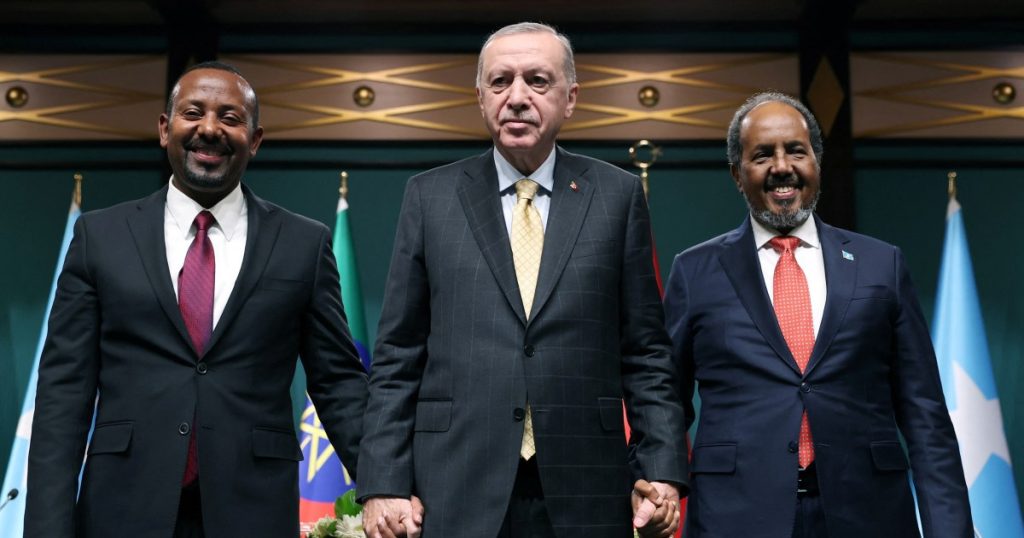The longstanding dispute between Somalia and Ethiopia over the breakaway region of Somaliland and Ethiopia’s pursuit of sea access has seen a potential breakthrough, facilitated by Turkish President Recep Tayyip Erdogan. Following talks in Ankara between Somali President Hassan Sheikh Mohamud and Ethiopian Prime Minister Abiy Ahmed, a joint declaration aimed at resolving the contentious issues was announced. President Erdogan expressed optimism that this agreement signifies a “historic reconciliation” and a crucial first step towards a future of cooperation and peace between the two nations. He highlighted the agreement’s focus on forging a new path forward, leaving past disagreements behind, and emphasized Turkey’s continued support in facilitating dialogue and cooperation. A key aspect of the agreement involves addressing Ethiopia’s desire for sea access, a matter of significant importance for the landlocked nation. Erdogan expressed confidence that Somalia would support Ethiopia’s pursuit of this objective.
The core issue driving the dispute centers around Somaliland, a self-declared independent region that seceded from Somalia over three decades ago. While Somaliland has maintained a relatively stable political environment in contrast to Somalia’s persistent struggles with insecurity, its claim to independence remains unrecognized by the international community, including the African Union and the United Nations. Somalia continues to assert its sovereignty over the region. Tensions escalated earlier this year when Ethiopia reportedly entered into an agreement with Somaliland to lease a portion of its coastline for port development and a military base in exchange for diplomatic recognition. While Ethiopia never officially confirmed this agreement, it triggered a strong reaction from Somalia, which viewed the deal as a violation of its sovereignty. This further complicated the regional dynamics, drawing in other actors like Egypt and Eritrea, longstanding rivals of Ethiopia, and raising concerns about the potential for renewed conflict.
The Ankara talks represent a significant step forward after previous attempts at mediation yielded limited progress. The agreement reached by the two parties outlines a commitment to setting aside their differences and focusing on achieving shared prosperity through cooperation. A crucial element of the agreement involves establishing commercial arrangements and bilateral agreements that would guarantee Ethiopia “reliable, safe, and sustainable access” to the sea, while respecting Somalia’s sovereign authority. This careful wording acknowledges the sensitivity surrounding Somaliland’s status and seeks to address Ethiopia’s needs without undermining Somalia’s territorial integrity. The agreement stipulates a timeline for technical discussions to commence by the end of February, with a target completion within four months. Turkey will continue to play a supportive role in facilitating dialogue and addressing any lingering disagreements.
Both Prime Minister Abiy and President Mohamud echoed the sentiment of reconciliation and expressed hope for a future of cooperation. Abiy emphasized that Ethiopia’s pursuit of sea access was a peaceful endeavor intended to benefit all neighboring countries and should be viewed through a lens of cooperation, not suspicion. Mohamud, in turn, affirmed Somalia’s readiness to collaborate with Ethiopia and its people, signaling a commitment to moving past the recent tensions. The agreement holds the promise of de-escalating a potentially volatile situation and fostering a more stable and cooperative relationship between the two Horn of Africa nations.
Turkey has positioned itself as a key mediator in the region, playing a pivotal role in facilitating the dialogue between Somalia and Ethiopia. This latest successful mediation further solidifies Turkey’s growing diplomatic influence in the Horn of Africa. The agreement reached in Ankara marks a significant step towards resolving a complex and sensitive issue that has the potential to reshape the political landscape of the region. The commitment to dialogue and cooperation provides a foundation for building a more secure and prosperous future for both Somalia and Ethiopia.
The successful mediation efforts by Turkey represent a significant diplomatic achievement and highlight the potential for peaceful resolution of complex regional disputes. The agreement between Somalia and Ethiopia not only addresses the immediate concerns surrounding Somaliland and sea access but also sets a precedent for future cooperation and conflict resolution in the Horn of Africa. The focus on shared prosperity and mutual respect for sovereignty provides a framework for building a more stable and integrated region. The continued involvement of Turkey as a mediator will be crucial in ensuring the successful implementation of the agreement and fostering long-term peace and stability in the region.

